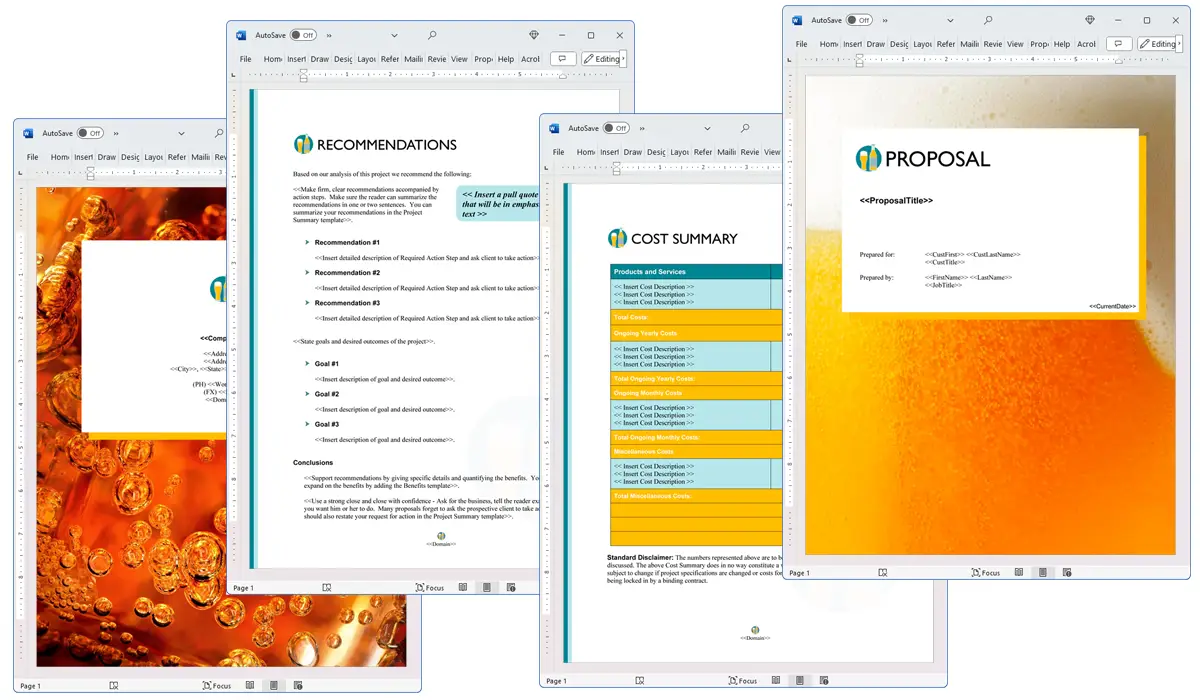What is the Loopholes chapter used for?
Proposal Kit Professional Bundle adds more design themes, all six Contract Packs,
a project management library, and Expert Edition software.

Illustration of Proposal Pack Bubbles #4
We include this Loopholes chapter template in every Proposal Pack, along with thousands more. You assemble this chapter with others in various combinations to create custom-tailored business proposals, plans, reports, and other documents. Proposal Packs apply custom visual designs to the templates, giving the final documents a consistent professional finish.
 DOWNLOADABLE, ONE-TIME COST, NO SUBSCRIPTION FEES
DOWNLOADABLE, ONE-TIME COST, NO SUBSCRIPTION FEES
Overview of the Loopholes Chapter
The Loopholes chapter is a specialized part of the Proposal Kit system, designed to address specific aspects of laws or regulations that may contain ambiguities or insufficient restrictions. This chapter helps organizations articulate how these gaps can be navigated or need to be sealed to ensure compliance and integrity. When constructing a proposal, this chapter can be for outlining potential advantages or ethical considerations that arise from existing legislative frameworks. It serves as an important tool for organizations looking to either leverage or rectify these legal nuances in their operations.
How is the Loopholes Chapter Used?
In business proposals, the Loopholes chapter is used to discuss the implications of certain legal loopholes relevant to the proposal's objectives. Organizations might use this chapter to outline how they can legally benefit from these loopholes to achieve their goals more efficiently or competitively. Alternatively, it can be employed to advocate for changes in policy or regulation by highlighting how current laws fail to fulfill their intended purpose. This dual-use nature makes the Loopholes chapter and valuable in various contexts where legal and regulatory frameworks come into play.
What is Included in the Loopholes Chapter?
Typically, the Loopholes chapter includes a detailed analysis of the specific loopholes related to the proposal's focus. It may provide:
- A description of the loophole and its origins.
- An explanation of how the loophole works and who it affects.
- The potential benefits and drawbacks of the loophole from a business perspective.
- Recommendations for leveraging the loophole responsibly or suggestions for regulatory adjustments.
- Case studies or historical examples where similar loopholes have played an important role.
This structured approach ensures that the chapter is informative and supports the proposal's overall objectives effectively.
Use Case Examples for the Loopholes Chapter
- Finance: A proposal to a bank might discuss loopholes in financial regulations that allow for more advantageous asset management strategies.
- Insurance: An insurance company might use this chapter to outline how certain policy loopholes could be closed to prevent insurance fraud.
- Legal: A law firm might detail how understanding contractual loopholes can protect clients from potential legal issues in business agreements.
- Government: A proposal to a government agency might advocate for the amendment of certain laws where loopholes lead to tax evasion.
- General Information: In a broader informational proposal, the chapter might discuss the ethical considerations of using loopholes in business practices.
Key Takeaways
- The Loopholes chapter is important for discussing legal ambiguities that can impact business operations.
- It can be used to either highlight benefits of existing loopholes or advocate for legal reforms.
- This chapter includes detailed analyses, recommendations, and possibly case studies.
- It is applicable across various industries including finance, insurance, legal, and government sectors.
- Understanding and appropriately using or addressing loopholes plays an important role in ethical business practices and regulatory compliance.

Illustration of Proposal Pack Contemporary #20
 What Our Clients Say
What Our Clients SayI have used the Proposal Pack software for years. The templates are so professional and easy to complete any type of proposal. Thank you for a great product!"
Be Seen Sales
 4.7 stars, based on 845 reviews
4.7 stars, based on 845 reviewsRelated Chapters
Document Layouts Using the Loopholes Chapter

The Loopholes chapter and other chapters are integrated into a Word document as illustrated here in the Proposal Pack Classic #21 design theme. There are hundreds of design themes available, and every design theme includes the Loopholes chapter template.
A proper business proposal will include multiple chapters. This chapter is just one of many you can build into your proposal. We include the complete fill-in-the-blank template in our Proposal Pack template collections. We also include a library of sample proposals illustrating how companies in different industries, both large and small, have written proposals using our Proposal Packs. This template will show you how to write the Loopholes.
We include a chapter library for you to build from based on your needs. All proposals are different and have different needs and goals. Pick the chapters from our collection and organize them as needed for your proposal.
Using the Proposal Pack template library, you can create any business proposal, report, study, plan, or document.
 Ian Lauder has been helping businesses write their proposals and contracts for two decades. Ian is the owner and founder of Proposal Kit, one of the original sources of business proposal and contract software products started in 1997.
Ian Lauder has been helping businesses write their proposals and contracts for two decades. Ian is the owner and founder of Proposal Kit, one of the original sources of business proposal and contract software products started in 1997.By Ian Lauder
 Published by Proposal Kit, Inc.
Published by Proposal Kit, Inc.


 Cart
Cart
 Facebook
Facebook YouTube
YouTube X
X Search Site
Search Site